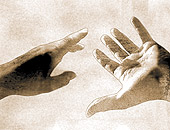 |
 |
| HANDS-ON TREATMENT: A new book on palliative care of HIV and AIDS patients |
Despite drugs, surgery, and radiation, the breast cancer had spread and the woman in her mid-40s was dying. After several months of treatment in a big hospital, she was now back home with her husband, son and daughter — a family pitched into emotional trauma, despair and a sense of utter helplessness. A family face-to-face with terminal illness.
It could strike with the swiftness of lightning — an incurable illness detected today in someone who was apparently hale and hearty yesterday. Alternatively, it could gradually creep upon a family, something dreaded and feared months in advance as medical treatment fails to control an illness. Families of a relative with terminal illness are likely to encounter severe emotional, psychological and financial problems. But the solutions to the problems might lie, paradoxically, within the families themselves.
A new book Family Care in HIV/AIDS, just released by New Delhi-based Sage Publications, stresses the need for enhancing counselling and support services to care-givers in the family. In the West, families have long been viewed as the social group most affected by the illness. In response, strategies such as family therapy counselling and family social work have emerged. In the book, author Premilla D’Cruz, an assistant professor at the Indian Institute of Management, Kozhikode, argues that similar strategies are required in the Indian context to assist care-giving families.
While the book focuses on HIV/AIDS, terminal illness can emerge from a range of other medical conditions — cancer, kidney failure caused by uncontrolled diabetes, liver failure from chronic infection or cirrhosis, among others. Whatever the cause, when doctors finally give up and declare a patient to be beyond medical help, it’s time for the family to take over. Home care specialists believe that given a choice, most people would prefer to spend the last days of their lives in their homes, surrounded by their loved ones. Patients in the terminal stage of an illness need palliative care, a branch of medicine that deals with the control of pain and other symptoms of the patients as well as counselling for patients and the family.
Doctors involved in palliative care say it is crucial for the family to acknowledge the situation and honestly inform the patient about the terminal stage of the illness. They say many patients remain in the dark because the family chooses not to inform them. Some families go into ‘denial mode’ believing that their doctors were wrong and that a cure might yet be available. “This is unfortunate because it’s only when a family acknowledges a problem that it can begin to face it,” says a New Delhi-based doctor involved in palliative care.
Patients in terminal stages of an illness may survive from a few weeks to over a year. “It’s important for families to realise that dying patients do not have to be miserable,” says Dr Meenu Singh, a doctor with Can Support, a non-government agency in New Delhi that has pioneered the concept of home-based palliative care in New Delhi. Appropriate medical care can help significantly reduce the pain associated with cancer or control other symptoms such as stomach ache or vomiting or even sleeplessness that affects the terminally ill.
While the degree of medical care required by a patient varies from one case to another, all families require counsellors. The trauma that a family experiences in anticipating the death of a loved one is justified, but a support system that shares its distress can help the family cope with the situation. “In terminal illness, we tell the family that while a cure is not possible, healing is possible,” says Sister Agnes Panikulam, a senior counsellor with Can Support. “We help them accept the situation and then find ways to cope with it,” she says. Over the past six years, the organisation has provided home-based palliative care and counselling to nearly 1,200 families.
In her experience, families quickly “open up completely,” and talk to counsellors about existing problems, worries about the future, distressed relationships. She recalls a visit to the home of the woman in her 40s dying of breast cancer. “Can you get my sister to visit me?” the woman asked her. The counsellor did speak to the estranged sister and got her to visit the woman.
“Unresolved issues involving relationships become very important to terminally ill patients,” says Sister Agnes. Counsellors say the patient’s departure is easier to bear when the irreversibility of the situation has been accepted by the family and when relationships between family members are excellent.
Home-based palliative care makes economic sense because of a majority of patients, particularly those afflicted with cancer, have spent their financial resources by the time they are through with treatment options.
The patient and the care-giver could be anyone in the family. Home care specialists say they have encountered children in their teens providing care to a middle-aged parent, an aged mother watching her boy in his mid-20s succumb to AIDS, a spouse waiting with wrenching frustration as cancer sucks the life out of his or her partner.
A key problem that families across India face is the lack of home-based palliative care services. The Can Support initiative has about 90 families on its registers at any given time. An emulation of the model established by Can Support in New Delhi would help thousands of families across India.










